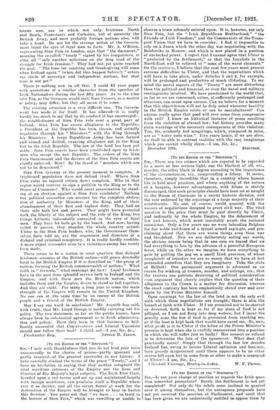[To TEE EDITOR or THE " SPECTATOR.") Sot,—There are two
crimes which are reputed to be regarded in a more or less serious light, one the blackest of all, viz., murder, the other black in degree according to the importance of the circumstances, viz., compounding a felony. It seems, therefore, simply incredible that in a country where human life is held most precious, and where anything of the nature of a bargain, however advantageous, with felons is sternly discouraged, that such principles should have been set at naught in the House of Commons in a recent historic division, and the vote endorsed by the rejoicings of a large majority of their constituents. No one, of course, would quarrel, with the success of negotiations designed to avert civil war. The vital question is the price that must be paid directly by Ulster, and indirectly. by the whole Empire, by the debasement of law and honour, which must 'inevitably numb the national conscience. Only a few years ago we were belauding Belgium for her noble resistance of a tyrant armed cap-h-pie, and pro- claiming aloud that there are worse things even than war and bloodshed. Now we are deliberately eating our words, the obvious reason being that in one case we feared that we had everything to lose by the advance of a powerful European force, while on the other we imagine we have everything to gain by putting the gag on a small Irish province, of whose complaints of injustice we are so weary that we have at last persuaded ourselves that they are imaginary. Take the state of Belfast! One paramount argument is advanced as an excuse for winking at treason, murder, and outrage, viz., that the traitors are patriots deserving of political consideration —an argument that clearly implies that the question of their allegiance to the Crown is a matter for discussion, whereas the exact contrary has been emphatically stated over and over again by the Prime Minister himself.
Open contempt for the law of the land is not the only evil with which these negotiations are fraught; there is also the breach of faith with Ulster. If I am promised not to be starved or drowned, faith is kept so far if my store of food is not pillaged, or I am not flung into deep waters; but I incur the penalty none the less if food is prevented from reaching me, or if the boat is kept back that would have saved me. So, now, what profit is it to Ulster if the letter of the Prime Minister's promise is kept when she is craftily manoeuvred into a position in which she will suffer just as badly? Her consent or refusal is to determine the fate of the agreement. What does that practically mean? Simply that through the last few decades Ireland has, owing to insane Liberal optimism and leniency, been grossly misgoverned until there appears to be no other course left open but in some form or other to make a scapegoat of Ulster !—I am, Sir, &c., Ullenhalt Vicarage, Henley-in-.4rden. W. F. Peurce.






































 Previous page
Previous page